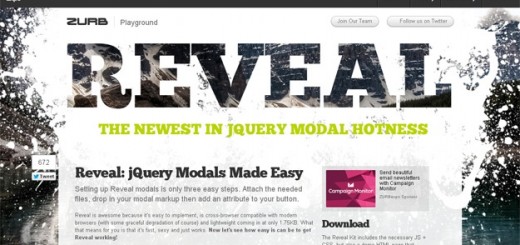Node.js is a platform built on Chrome’s JavaScript runtime for easily building fast, scalable network applications. Node.js uses an event-driven, non-blocking I/O model that makes it lightweight and
efficient, perfect for data-intensive real-time applications that run across distributed devices.
Node.js internally uses the Google V8 JavaScript engine to execute code, and a large percentage of the basic modules are written in JavaScript. Node.js contains a built-in asynchronous i/o library for file, socket and HTTP communication. The HTTP and socket support allows Node.js to act as a web server without additional web server software such as Apache.
In this article we have gathered up a list of 15 Best Minimal Node.js Frameworks which will help you to develop creative web applications. Which Node.js Framework do you use or favorite, please comment below, we would love to hear your feedback. Enjoy !!
1. Express.js
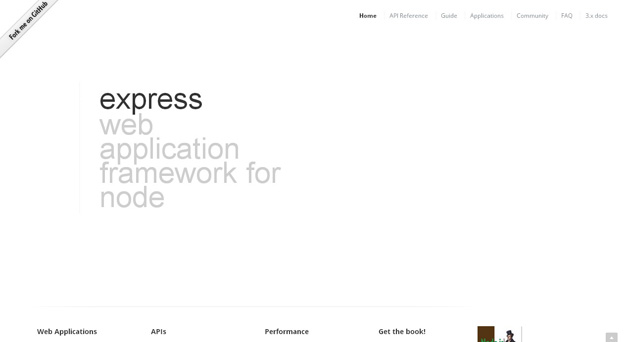
Express is a high performance and minimal web development framework for Node.js. The Express philosophy is to provide small, robust tooling for HTTP servers. Making it a great solution for single page applications, web sites, hybrids, or public HTTP APIs.Built on Connect you can use only what you need, and nothing more, applications can be as big or as small as you like, even a single file.
2. Koa
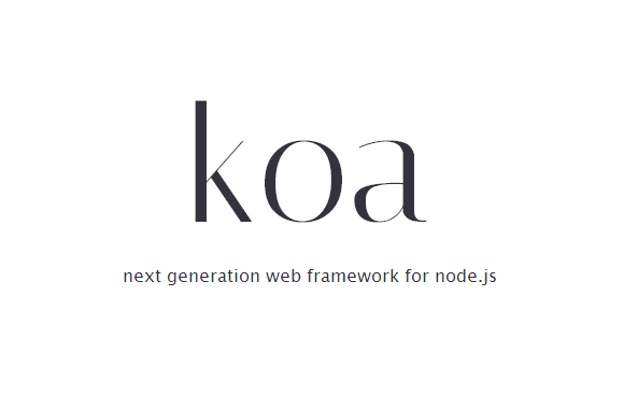
Koa is a new web framework designed by the team behind Express, which aims to be a smaller, more expressive, and more robust foundation for web applications and APIs. Through leveraging generators Koa allows you to ditch callbacks and greatly increase error-handling. Koa does not bundle any middleware within core, and provides an elegant suite of methods that make writing servers fast and enjoyable.
A Koa application is an object containing an array of middleware generator functions which are composed and executed in a stack-like manner upon request. Koa is similar to many other middleware systems that you may have encountered such as Ruby’s Rack, Connect, and so on – however a key design decision was made to provide high level “sugar” at the otherwise low-level middleware layer. This improves interoperability, robustness, and makes writing middleware much more enjoyable.
3. Flatiron
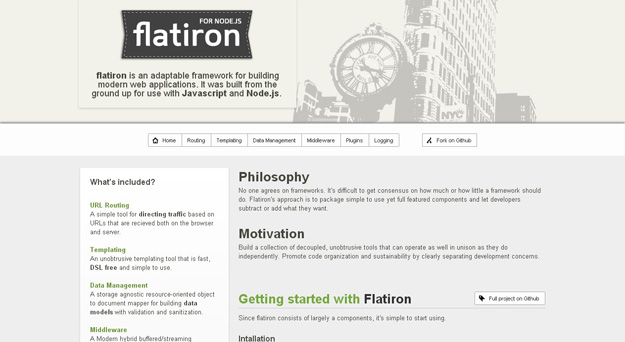
It’s difficult to get consensus on how much or how little a framework should do. Flatiron is an unobtrusive framework initiative for node.js. No one agrees on frameworks. Flatiron’s approach is to package simple to use yet full featured components and let developers subtract or add what they want.
Flatiron promotes code organization and sustainability by clearly separating development concerns. Each component works elegantly with or without its counterparts. Many of the components work the same in the browser as they do on the server. This is the motivation behind flatiron.
4. Sails.js
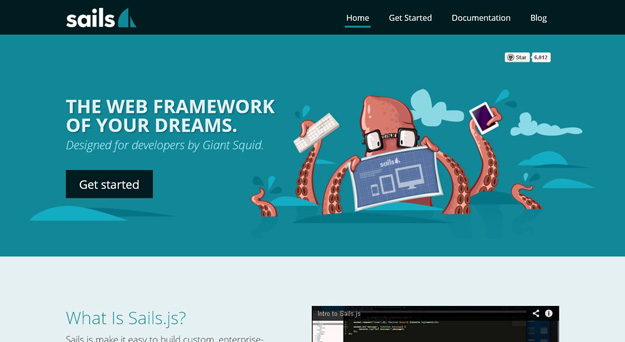
Sails.js makes it easy to build custom, enterprise-grade Node.js apps. It is designed to resemble the MVC architecture from frameworks like Ruby on Rails, but with support for the more modern, data-oriented style of web app development. It’s especially good for building realtime features like chat.
Sails.js API scaffolding is nothing like Rails scaffolding. Instead, Sails automatically builds a RESTful JSON API for your models. And here’s the thing, it supports HTTP and WebSockets. By default, for every controller you create, you get the basic CRUD operations created automatically.
5. Restify
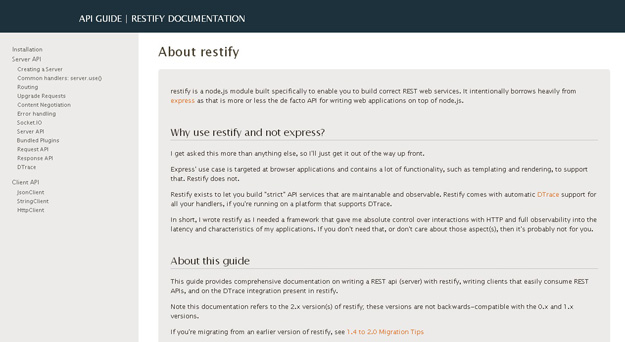
restify is a node.js module built specifically to enable you to build correct REST web services. It intentionally borrows heavily from express as that is more or less the de facto API for writing web applications on top of node.js. Restify exists to let you build “strict” API services that are maintanable and observable. Restify comes with automatic DTrace support for all your handlers, if you’re running on a platform that supports DTrace.
1. Total.js
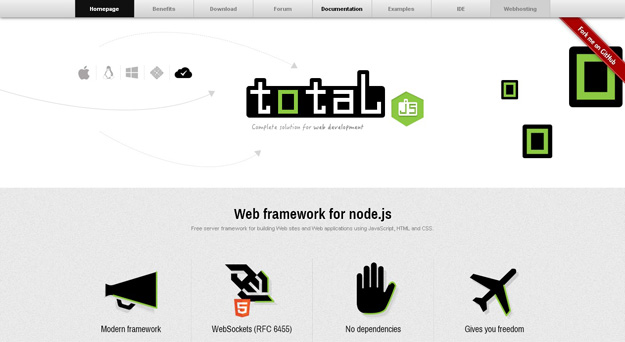
Total.js is one of the best web application frameworks for creating a rich web sites and web services. The framework has good documentation and contains many examples. It supports friendly URL, XHR, JSON, LESS CSS (CSS 3), JavaScript minifier, XSS protected, resources, modules and supports MVC architecture.
The framework has no dependencies. Complete functionality is built in its core. You can install any module by the Node Package Manager. Framework doesn’t limit you. You can write whatever you want or rewrite existing functionality. It’s easy, simple and safe.
7. SocketStream
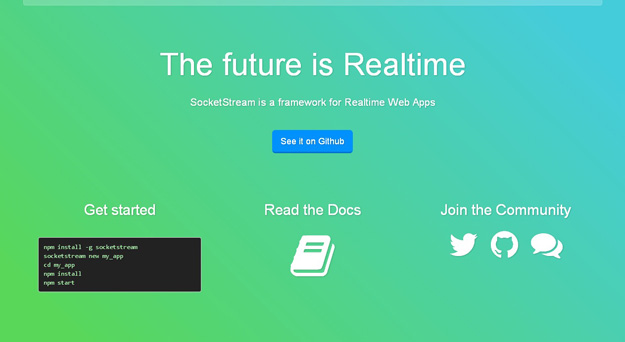
SocketStream is a new breed of web framework that uses websockets to push data to the browser in ‘realtime’. It makes it easy to create blazing-fast, rich interfaces which behave more like desktop apps than traditional web apps of the past. By taking care of the basics, SocketStream frees you up to focus on building your social/chat app, multiplayer game, trading platform, sales dashboard, or any kind of web app that needs to display realtime streaming data. All personal tastes (e.g. Vanilla JS vs CoffeeScript, Stylus vs Less) are catered for with optional npm modules that integrate perfectly in seconds, without bloating the core.
8. Locomotive
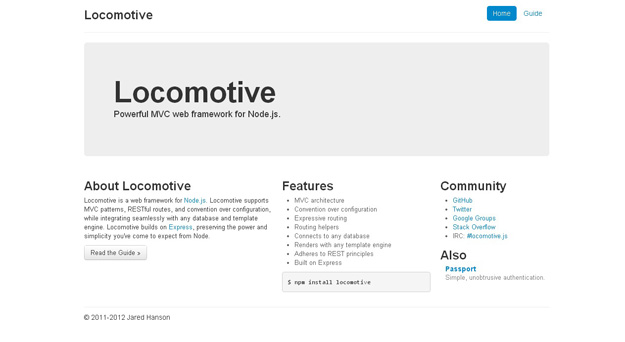
Locomotive is a web framework for Node.js. Locomotive supports MVC patterns, RESTful routes, and convention over configuration, while integrating seamlessly with any database and template engine. Locomotive builds on Express, preserving the power and simplicity you’ve come to expect from Node.
9. Socket.io
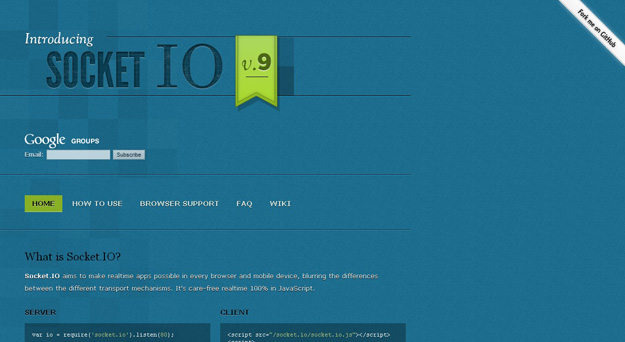
Socket.io is realtime application framework for Node.JS, with HTML5 WebSockets and cross-browser fallbacks support.
10. Derby
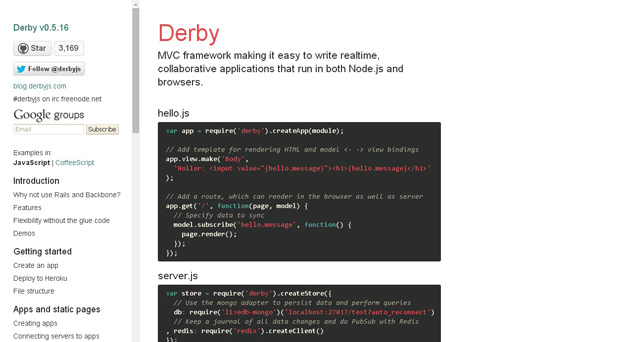
The Derby MVC framework makes it easy to write realtime, collaborative applications that run in both Node.js and browsers. Derby includes a powerful data synchronization engine called Racer that automatically syncs data among browsers, servers, and a database. Models subscribe to changes on specific objects, enabling granular control of data propagation without defining channels. Racer supports offline usage and conflict resolution out of the box, which greatly simplifies writing multi-user applications.
11. Hapi
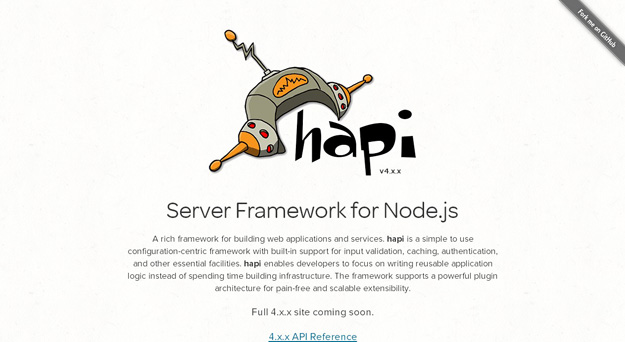
A rich framework for building web applications and services. hapi is a simple to use configuration-centric framework with built-in support for input validation, caching, authentication, and other essential facilities. hapi enables developers to focus on writing reusable application logic instead of spending time building infrastructure. The framework supports a powerful plugin architecture for pain-free and scalable extensibility.
12. Frisby.js
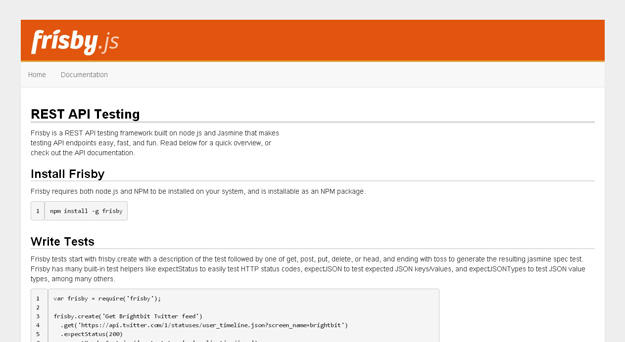
Frisby is a REST API testing framework built on node.js and Jasmine that makes testing API endpoints easy, fast, and fun. Frisby is built on top of the Jasmine BDD framework, and uses the jasmine-node test runner to run spec tests.
13. Coke
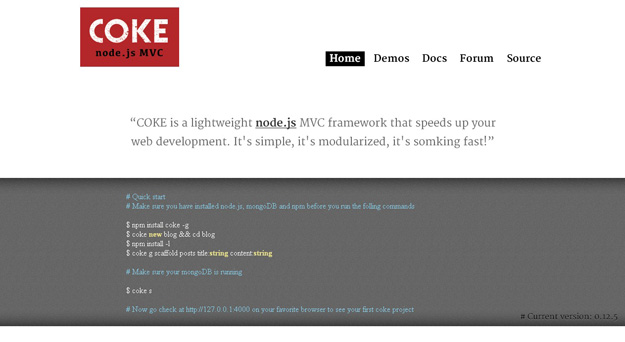
COKE is a lightweight node.js MVC framework that speeds up your web development. It’s simple, it’s modularized, it’s somking fast! COKE is built on top of the popular web framework Express, which means you can use all middlewares from Express and Connect directly in COKE. It does not add too many magic, instead it provides a clean and well structured project bootstrap for you.
14. Kiss.js
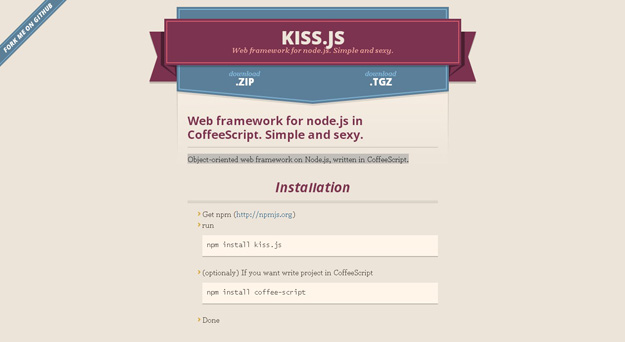
Object-oriented web framework on Node.js, written in CoffeeScript.
15. Express.io
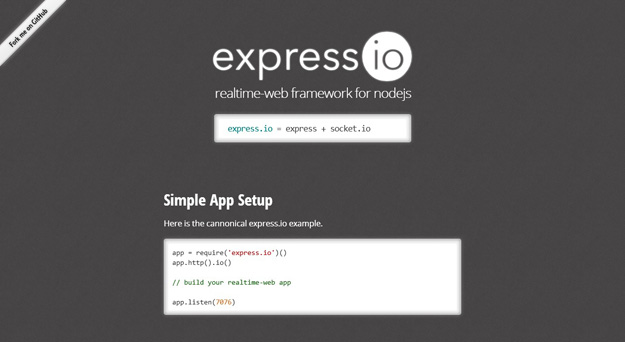
Express.io is realtime web framework for Node.js, supports MVC architecture for create web applications.



